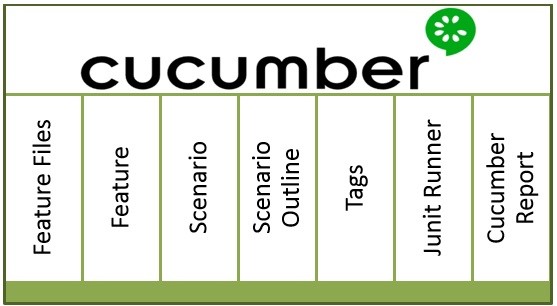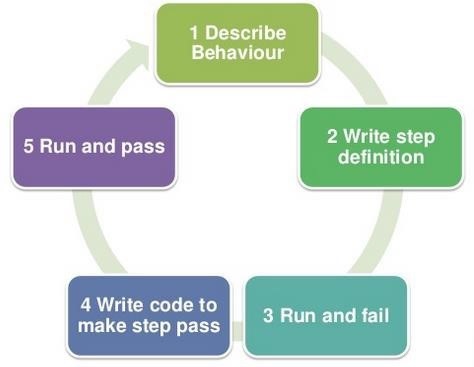DESCRIPTION:
Cucumber is a testing tool that supports Behavior Driven Development (BDD) framework. It defines application behavior using simple English text, defined by a language called Gherkin
Cucumber supports over a dozen different software platforms like −
- Ruby on Rails
- Selenium
- PicoContainer
- Spring Framework
- Watir
The major steps that BDD follows, in order to facilitate Automated Testing are:
- Developing each attribute with the necessary new behaviour
- Supporting the behaviour with accurate patterns
- Turning those patterns into executable automated tests
- Checking for the pass and fail of these tests to come to an accurate behaviour

- Feature Files
These files are a vital part of Cucumber meant to write testing automation methods and acceptance tests. All the feature files end with a .feature extension.
- Feature
This provides data about the top most intent and the basic objective of the application which is being tested.
- Scenario
This focuses on a single functionality which is being taken up for automated testing. Having a glance through the scenario, one should be able to judge the sole objective behind the test. There is a particular format that each scenario follows and this language is known as ‘Gherkin’:
- Given: Prior settings
- When: At the time of some action
- Then: Anticipated result
- Background: Steps to be executed in each scenario
- And: Merge 2 or more similar actions
- Scenario Outline
These are used when a similar test is to be performed on different data sets.
- Tags
Tags are named for feature files and for scenarios when a similar set is to be executed for multiple instances.
- Junit Runner
Cucumber uses standard Junit Runner to execute a particular feature file, while automated testing.
- Cucumber Report
It generates its own html format.
Why is Cucumber so Popular as an Automated Testing Tool?
- It is optimized for BDD.
- It has a strong support for certain task oriented activities between the team mates and other stakeholders, hence bridges the gap
- It has flexibility to grow your own structure based on certain fixed ones encompassing the Given-When-Then structure.
- Cucumber has nominal syntax inclusion, with the Gherkin language, leads to a simplistic approach and user friendly approach for its users.
- It is available for multiple platforms like Ruby, Java, .NET, JavaScript etc.
- It has an easy to read syntax
- It can use a web drive or can be isolated, while automated testing.
- It largely focuses on customer centric behaviour rather than developer centric.
- Cucumber is one of the few tools which can be effectively used before, during and after coding.
- It has quite a lot of potential to form an agile environment.
Software Testing Solutions, your testing partner, offers a range of QA and Manual / automated testing Services encompassing the entire software release lifecycle. With a stringent focus on quality and processes, we have been implementing several testing projects in a multitude of technologies. Request for a Free POC to test drive our services.
Cucumber/SpecFlow doesn’t require you to write a When-step or rather Given/When/Then’s are just executed in the order they are written in the scenario.
Behavior-driven development’s approach involves the usage of shared language that enhances communication between various tech and non-tech teams. Tests are more user-focused and based on the system’s behavior. In BDD, “Given-When-Then” is the proposed approach for writing test cases.
Consider the below example for better understanding:
- Given the user has entered invalid credentials
- When the user clicks submit button
- Then display the proper validation message

Benefits of using Cucumber Testing Tools
1.Involving stakeholders becomes easier regardless of their programming knowledge
2.Testers can write Test scripts without having in-depth knowledge of programming
3.Plugins are faster as compared to Selenium
4.Supports various programming languages
5.code can be reused
